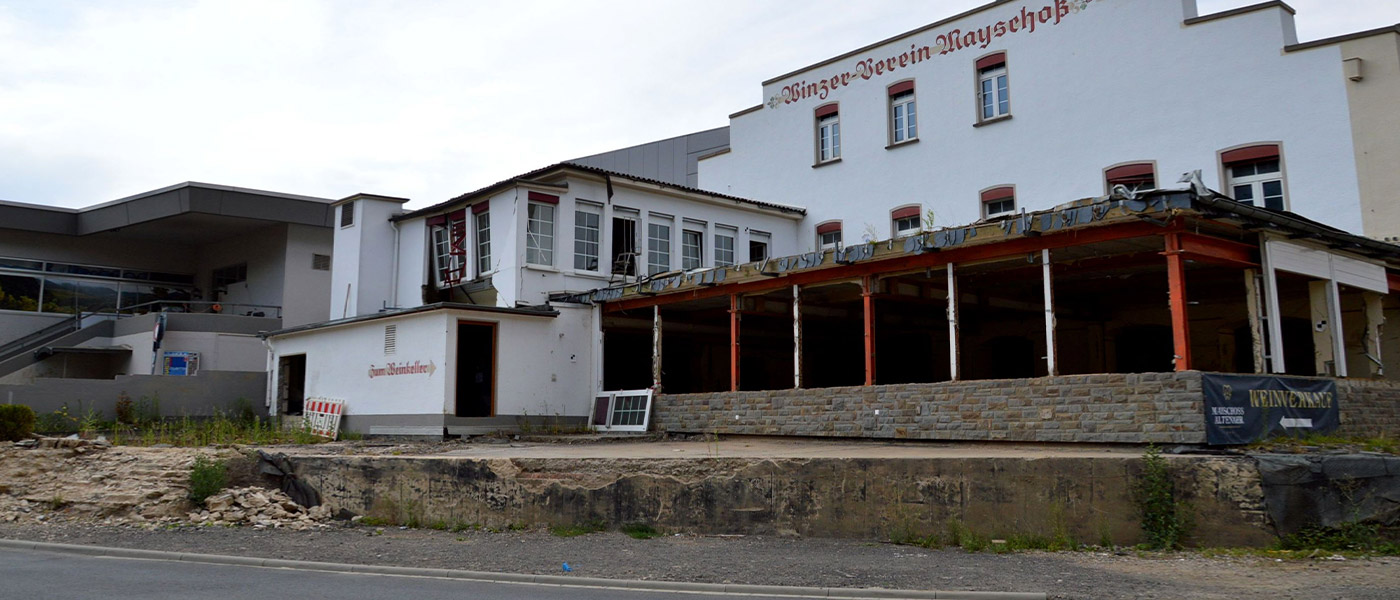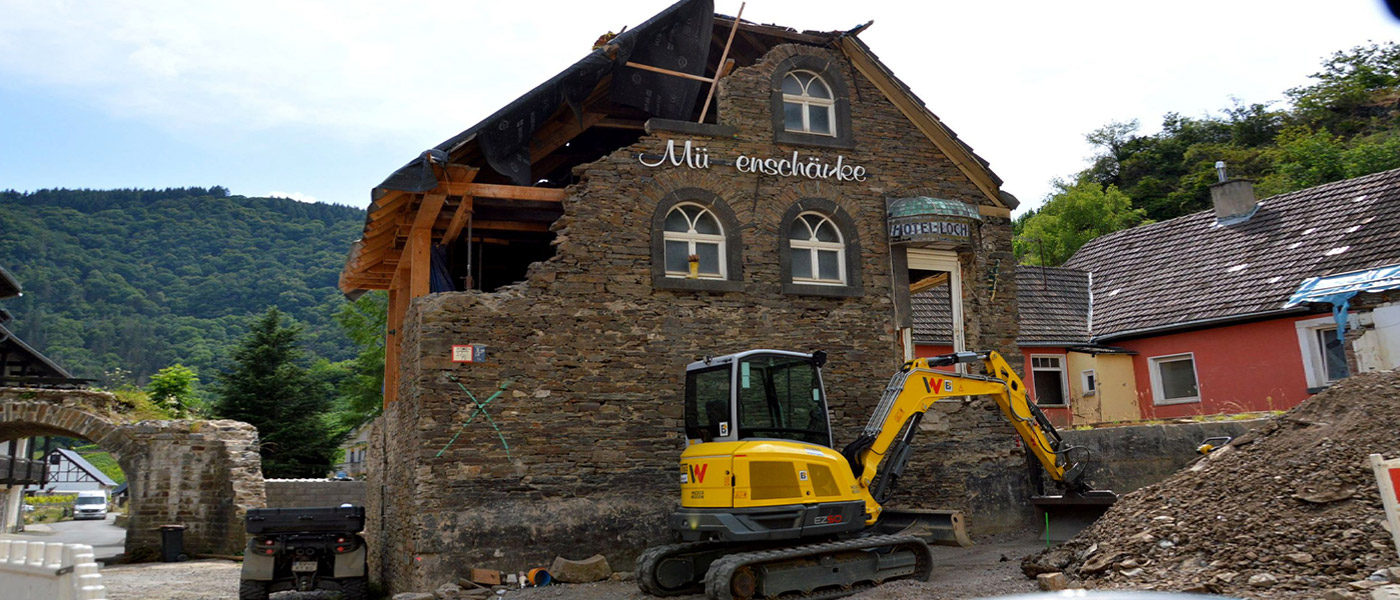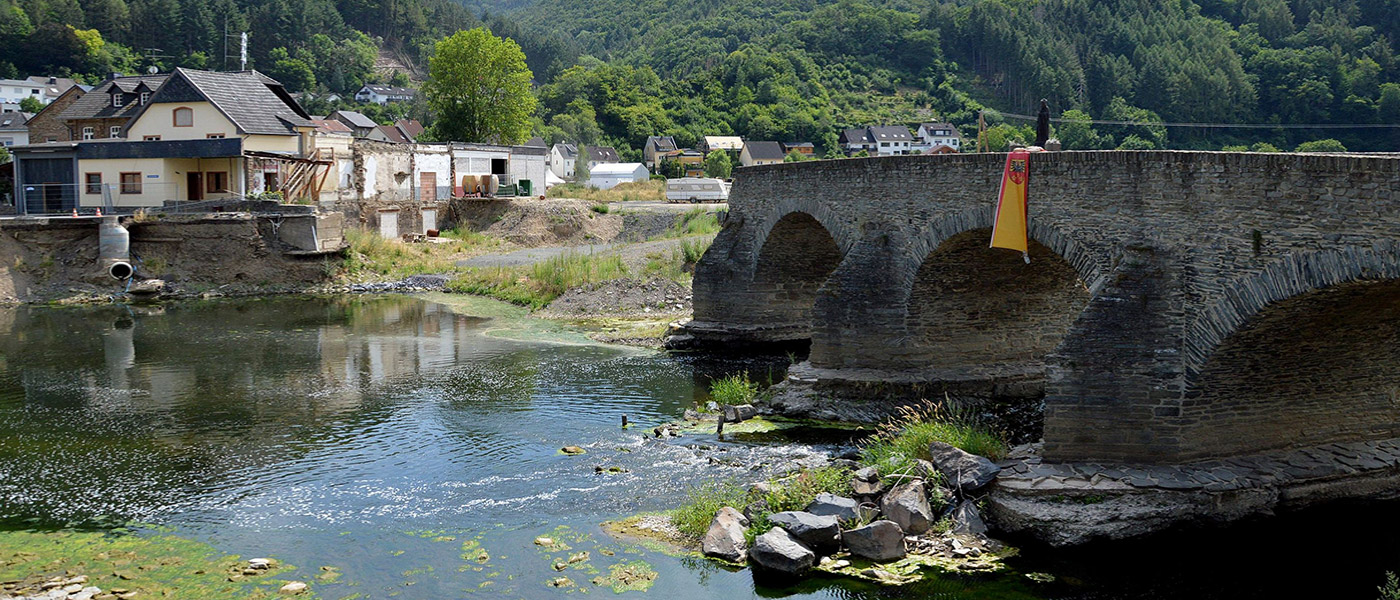Cellar number 6" was a legend, now an empty opening yawns here, the floor is full of rubble - the historic main building of the Mayschoß-Altenahr winegrowers' cooperative is now only a landscape of ruins. The vinotheque of Germany's oldest winegrowers' cooperative, the 150-year-old cellar, the restaurant, the cellar - everything fell victim to the floods in the night of 14 to 15 July 2021.
One year later, nothing is really well in the Ahr valley: 9,000 buildings were destroyed that night, 90 percent of them have not been rebuilt to this day. Many places along the Ahr are still ghost towns: ground floor facades stand boarded up, only the beams of half-timbered houses remain. Bridges tower over the river, destroyed, many hotels and restaurants are closed.
 |
"We will demolish everything: the old main building, the vinotheque, the administration and the shipping hall," reports Dirk Stephan, managing director of the winegrowers' cooperative in an interview with wein.plus. The water was nine metres high on the night of the flood, the brown broth flowed up to the second floor. The damage is so extensive that reconstruction is uneconomical, Stephan reports; the damage is estimated at around 15.5 million euros. One year after the gigantic flood wave, disillusionment reigns in the valley, because reconstruction is simply not progressing. The atmosphere lies like a blanket of anger, resignation and exhaustion over the valley. "The mood is very depressed," reports Philipp Nelles, junior manager of the VDP winery of the same name: "Not everyone is in as good a mood as they were a year ago."
About a year ago, a harvest that defied all odds brought a bit of post-apocalypse euphoria, but the momentum has faded. "At the moment everything is going very slowly and sluggishly," Nelles reports. There is an acute shortage of craftsmen in the valley, and there is also a shortage of materials. "You have to wait four months for refrigerators, fire alarm systems have long delivery times because of the built-in chips," he lists. "Here on site, where there was usually always something good to do, it is very, very quiet."
The Nelles winery in Heimersheim on the lower Ahr was also flooded by the gigantic wave, the cellars badly destroyed. And yet some normality is slowly returning here: "We are about to open our new vinotheque," Nelles reports proudly: "You can buy wine from us, drink it and eat something - it's coming back bit by bit." The restaurant next door has been open again for a few days, he says, and there are garden chairs on the lawn - with a view of the vineyards. A piece of happiness.
 |
After the great success of the 2021 flood wine campaign, however, many vintners are now facing major sales problems: "We are suffering enormously from the lack of tourism," says Peter Kriechel, chairman of Ahrwein e.V. and himself a vintner from Walporzheim who is affected: "We would now have peak season, normally the valley would be fully booked by now." Instead, local sales have dropped significantly, currently 15 to 20 percent below the sales figures before the Corona pandemic, Kriechel estimates.
Added to this is the general slump in wine sales of up to 30 per cent due to war and inflation. The Ahr Valley has been hit particularly hard: "Not only have we been deprived of buildings and vineyards, but also of the entire marketing infrastructure," says Kriechel. And so they are now trying to attract customers with a "wine beach" on the town wall of Ahrweiler, doing construction site wine tastings in the shell of the vinotheque. "That's authentic, and people sit on the beer set and have fun," says Kriechel.
In other wineries, even the buildings are no longer standing. The VDP winery Meyer-Näkel was almost completely destroyed in the night of the flood, the large production hall on the river slashed open as if with a can opener, says Meike Näkel. On the anniversary, Federal President Frank-Walter Steinmeier came by. Astonished, depressed and wordless, the head of state stood in front of the photos of the gigantic destruction.
Much of the equipment in the rebuilt hall is still on loan from other winegrowers - here, too, reconstruction is stalling. The biggest problem is that the government aid is not arriving. Of 15 billion euros in reconstruction aid from the federal government, only 500 million euros have been approved and paid out to date. "It's really complicated, we have to submit seven different applications alone," Nelles reports: "It's not necessarily made easy, it's difficult and time-consuming."
And so many wineries have not even submitted applications to date - day-to-day business simply took precedence. "One started with pure disaster, then our focus was very quickly on the current harvest - that gave an adrenaline rush," Kriechel reports. Since March and April, "we have been in a phase of disillusionment," he reports. And yet: not a single one of the long-established winegrowers wants to give up, reports the head of the association: "They all have a plan for how to continue."
 |
Everywhere, improvised sales stalls are sprouting from the ground, small vinotheques in the courtyard, reconstructed sections. And at least: after months of tug-of-war with the authorities, donations from the flood wine initiative are finally flowing. 47,500 mud-covered bottles salvaged from the cellars were sold for the benefit of the Ahr vintners. The disbursement of the approximately 4.5 million euros was prevented by donation laws and immovable ministries.
Now, however, there is a solution, Kriechel reports: the flood wines are now counted as a purchase per bottle, and the state of Rhineland-Palatinate is waiving sales tax. About half - about two million euros - have been paid out in the meantime, and another two million euros are on their way. The donations from the "SolidAHRitäts" campaign by Dirk Würtz from the St. Antony winery in Rheinhessen as well as from the VDP are now also flowing to the damaged businesses as "sponsoring" after just as long a delay.
The flood wine relief campaign should not have been the last idea for a modern Ahr wine region: On the anniversary, the Flutwein initiative auctioned off one of the last original bottles for 30,000 euros. However, the 2012 Pinot Noir, "Ahrweiler Rosenthal", was auctioned off at the same time as a digital NFT image - a novelty in the wine world. "We have many ideas to reposition the Ahr Valley, there is a great willingness to go new ways," says Kriechel.
Many wineries are now planning more environmentally friendly, modern, flood-adapted new buildings, including in Mayschoß: "We also have the chance to start over and rebuild because of the state aid," says Stephan: "We can create something for the next 50 years that will serve the next generation of winegrowers." They want to start demolition in Mayschoß at the end of 2022 and rebuilding at the beginning of 2023 - flood-compliant, of course. "We're trying to take the old heart with us and incorporate it into the building," Stephan promises, "We have to step on the gas now and look forward."